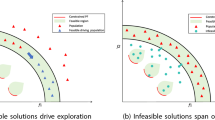Abstract
In this paper we present and evaluate an evolutionary approach for learning new constraint satisfaction algorithms, specifically for MAX-SAT optimisation problems. Our approach offers two significant advantages over existing methods: it allows the evolution of more complex combinations of heuristics, and; it can identify fruitful synergies among heuristics. Using four different classes of MAX-SAT problems, we experimentally demonstrate that algorithms evolved with this method exhibit superior performance in comparison to general purpose methods.
Preview
Unable to display preview. Download preview PDF.
Similar content being viewed by others
References
Borchers, B., Furman, J.: A two-phase exact algorithm for MAX-SAT and weighted MAX-SAT problems. Journal of Combinatorial Optimization 2, 299–306 (1999)
Xing, Z., Zhang, W.: Efficient strategies for (weighted) maximum satisfiability. In: Wallace, M. (ed.) CP 2004. LNCS, vol. 3258, pp. 690–705. Springer, Heidelberg (2004)
Wolpert, D.H., Macready, W.G.: No free lunch theorems for optimization. IEEE Transactions on Evolutionary Computation 1, 67–82 (1997)
Minton, S.: Automatically configuring constraint satisfaction programs: A case study. Constraints 1, 7–43 (1996)
Epstein, S.L., Freuder, E.C., Wallace, R., Morozov, A., Samuels, B.: The adaptive constraint engine. In: Van Hentenryck, P. (ed.) CP 2002. LNCS, vol. 2470, pp. 525–540. Springer, Heidelberg (2002)
Fukunaga, A.: Automated discovery of composite SAT variable-selection heuristics. In: AAAI 2002, Canada, pp. 641–648 (2002)
Koza, J.: Genetic Programming: On the programming of computers by means of natural selection. MIT Press, Cambridge (1992)
Zhang, H., Stickel, M.: Implementing the Davis-Putnam method. Journal of Automated Reasoning 24, 277–296 (2000)
Author information
Authors and Affiliations
Editor information
Editors and Affiliations
Rights and permissions
Copyright information
© 2005 Springer-Verlag Berlin Heidelberg
About this paper
Cite this paper
Bain, S., Thornton, J., Sattar, A. (2005). Evolving Variable-Ordering Heuristics for Constrained Optimisation. In: van Beek, P. (eds) Principles and Practice of Constraint Programming - CP 2005. CP 2005. Lecture Notes in Computer Science, vol 3709. Springer, Berlin, Heidelberg. https://doi.org/10.1007/11564751_54
Download citation
DOI: https://doi.org/10.1007/11564751_54
Publisher Name: Springer, Berlin, Heidelberg
Print ISBN: 978-3-540-29238-8
Online ISBN: 978-3-540-32050-0
eBook Packages: Computer ScienceComputer Science (R0)




